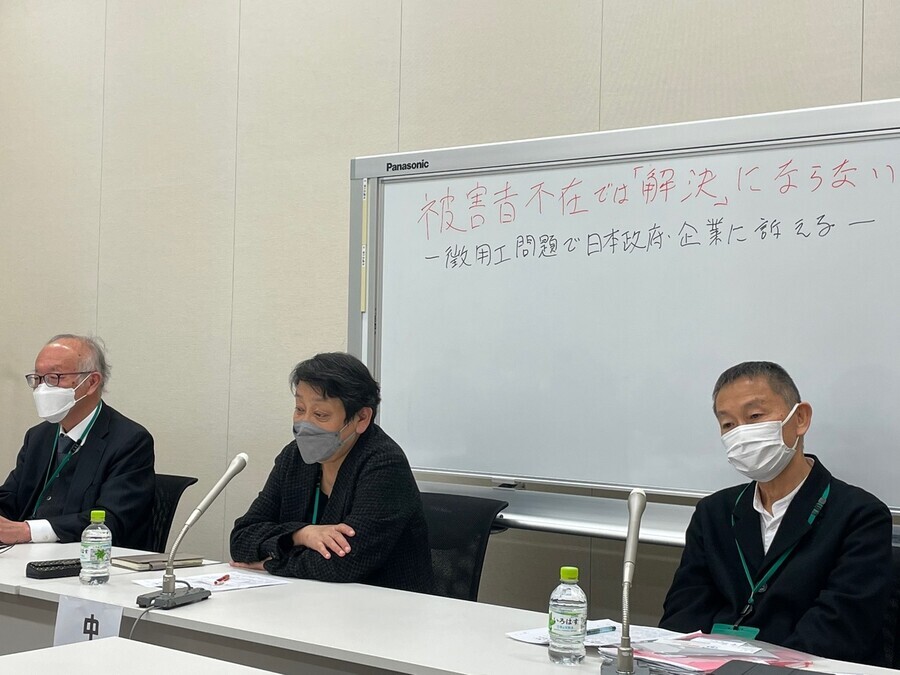hankyoreh
Links to other country sites 다른 나라 사이트 링크
Calls mount within Japan for Korea’s forced labor victims to get their due

Japanese civic groups are slamming a recently unveiled plan calling for a third party — not the Japanese government itself — to compensate wartime Korean forced laborers.
The issue of compensating wartime forced laborers is one of the biggest pending issues between Seoul and Tokyo.
“We can’t call a plan a solution if the accused companies offer no apologies and provide not even a single yen in compensation.”
Atsushi Okamoto, the former editor-in-chief of the journal Sekai (“The World”), writer Kei Nakazawa, and Hideki Yano, the secretary-general of the civic group Japan-Korea Joint Action for Legislation to Compensation Korean Victims of Forced Labor, made the criticism during a press conference on the forced labor issue in Tokyo on Monday.
With the South Korean Ministry of Foreign Affairs officializing during a public debate on Thursday a proposed solution calling on companies to “voluntarily” collect money to provide compensation to forced labor victims — instead of the Japanese companies accused of using forced labor providing it themselves — Japanese civic groups that have supported the victims of wartime forced labor for decades strongly criticized the plan’s faults.
The groups released a statement titled, “No Solution without the Victims: Appealing to the Japanese Government and Japanese Corporations on the Forced Labor Issue,” signed by 94 scholars, lawyers, journalists and civic activists including University of Tokyo professor emeritus Haruki Wada.
Yano said the statement intended to convey that while negotiations between Seoul and Tokyo on the forced labor issue are progressing rapidly, “the problem won’t be resolved if you don’t convince the victims.”
Yano is an activist who has assisted forced labor victims with their lawsuits for 27 years, demanding apologies and compensation from the Japanese government and certain Japanese corporations.
The statement said Japanese corporations are party to the Korean Supreme Court’s 2018 decision stipulating compensation for victims of forced labor, and that civil suit decisions have acknowledged that forced labor took place and called on the companies to provide compensation.
“The accused companies cannot solve the problem by shifting their liabilities onto somebody else to pay instead,” they said.
“Global companies must actively contribute to a solution from the perspective of respecting human rights, a ‘global standard.’”
They also criticized the Japanese government’s claim that the 1965 “Agreement Between Japan and the Republic of Korea Concerning the Settlement of Problems in Regard to Property and Claims and Economic Cooperation” completely resolved the forced labor issue.
Mentioning post-1965 developments such as the 1995 “Murayama Statement” --- an apology for Japan’s colonial rule and aggressive wars — and the 1998 “New Japan-Republic of Korea Partnership towards the Twenty-first Century” — which offered heartfelt reflection and an apology for colonial rule --- the statement stressed that “one cannot pass over the forced labor issue as a concluded matter.”
Above all else, the Japanese civic groups stressed that a solution that doesn’t accommodate the victims — who have fought for decades — isn’t a solution.
The statement highlighted comments by Yang Geum-deok, a victim of Mitsubishi Heavy Industries who said she “cannot pass away before receiving an apology from Japan,” and Lee Chun-sik, a victim of Nippon Steel, who said he “hoped to see a solution while he was still alive.”
Yang and Lee were forced labor victims who launched the Korean Supreme Court case.
The statement said the victims are not convinced by the solution plan (revealed by the Korean government).
“A solution that leaves the victims out actually abandons a solution,” it said.
Nakazawa, the writer who took part in the press conference, said, “We have a good opportunity to forge again a new relationship between Korea and Japan.”
“The most important thing is crafting a solution that can convince the victims,” she said.
Okamoto, the former editor-in-chief of “Sekai,” said one mustn’t say things are concluded just because the Japanese government has apologized for the past.
He stressed, “A true apology acknowledges the past, provides an apology and compensation and offers efforts not to repeat (what happened).
By Kim So-youn, Tokyo correspondent
Please direct questions or comments to [english@hani.co.kr]

Editorial・opinion
![[Column] Welcome to the president’s pity party [Column] Welcome to the president’s pity party](https://flexible.img.hani.co.kr/flexible/normal/500/300/imgdb/original/2024/0515/3917157400447943.jpg) [Column] Welcome to the president’s pity party
[Column] Welcome to the president’s pity party![[Editorial] Korea must respond firmly to Japan’s attempt to usurp Line [Editorial] Korea must respond firmly to Japan’s attempt to usurp Line](https://flexible.img.hani.co.kr/flexible/normal/500/300/imgdb/original/2024/0514/2317156736305813.jpg) [Editorial] Korea must respond firmly to Japan’s attempt to usurp Line
[Editorial] Korea must respond firmly to Japan’s attempt to usurp Line- [Editorial] Transfers of prosecutors investigating Korea’s first lady send chilling message
- [Column] Will Seoul’s ties with Moscow really recover on their own?
- [Column] Samsung’s ‘lost decade’ and Lee Jae-yong’s mismatched chopsticks
- [Correspondent’s column] The real reason the US is worried about Chinese ‘overcapacity’
- [Editorial] Yoon’s gesture at communication only highlights his reluctance to change
- [Editorial] Perilous stakes of Trump’s rhetoric around US troop pullout from Korea
- [Guest essay] Preventing Korean Peninsula from becoming front line of new cold war
- [Column] The state is back — but is it in business?
Most viewed articles
- 1[Column] Welcome to the president’s pity party
- 2[Editorial] Korea must respond firmly to Japan’s attempt to usurp Line
- 3Korea cedes No. 1 spot in overall shipbuilding competitiveness to China
- 4Could Korea’s Naver lose control of Line to Japan?
- 5[Editorial] Transfers of prosecutors investigating Korea’s first lady send chilling message
- 6[Column] Will Seoul’s ties with Moscow really recover on their own?
- 7US has always pulled troops from Korea unilaterally — is Yoon prepared for it to happen again?
- 8Second suspect nabbed for gruesome murder of Korean in Thailand, 1 remains at large
- 9Korean auto industry on edge after US hints at ban on Chinese tech in connected cars
- 10Major personnel shuffle reassigns prosecutors leading investigations into Korea’s first lady